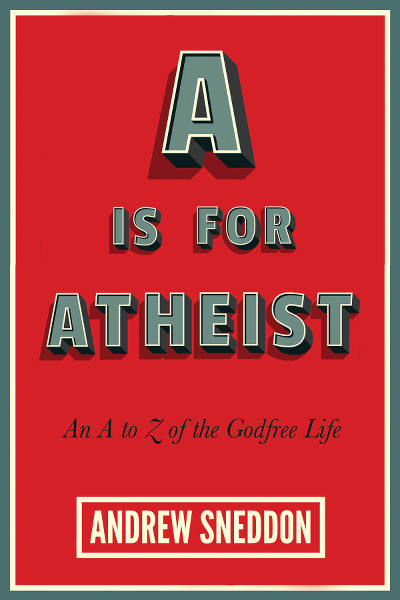If you’re starting to explore atheism, it might be tough to know where to begin, in part because, outside of the God question, 100 different atheists may believe 100 different things.
Andrew Sneddon, a professor of philosophy, has written a primer on godlessness just for that audience. He covers various topics, in a dictionary-like way, introducing them to strangers who may never have considered them from an atheist perspective. It’s called A Is for Atheist: An A to Z of the Godfree Life (Pitchstone Publishing, 2016):

In the excerpt below, Sneddon explains Holidays and Hope:
Holidays: Many holidays, even ones recognized by secular states, are either overtly or historically religious. It’s right there in the word: holy-day. This puts atheists in a bit of a bind (see Xmas). The bottom line is that we can participate with a clear conscience (well, mostly). Still, it would be nice for there to be more secular holidays, or secular substitutions for religious ones. These vary by country, but in Canada, where I live, thank goodness for such occasions as Labour Day, Remembrance Day, Robbie Burns Day (why not?), and so on. I will be happy to trade religious holidays for secular ones. Heck, I’d like two secular holidays for every religious one that we give up, if possible. Why not?
Hope: Is this a hopeless worldview that I offer? Religion offers many things: an ultimate meaning of life and death, everlasting life in lieu of mortality, the ultimate punishment of wrongdoers. A godfree world offers none of these things. Does it thereby condemn us to despair?
Well, there are hopes and then there are hopes. Whether the godfree life is hopeless will depend on what you value and fear.
Consider a schoolchild who, day in and day out, suffers at the hands of bullies. Every morning this child awakes and thinks, “I hope they leave me alone today.” This is a hope that is generated by the fears that the child faces.
Whether the godfree life offers hopes in this sense will depend on what you fear. If you grew up fearing hell, as I did, then the adoption of a perspective that promises nonexistence when you die is a hopeful one, in that it assuages this fear. If, however, you fear nonexistence, as many people seem to, then atheism offers no hope. The grim reality is that with death you will cease to exist; to live godfree is to be forced to accept this and live with it. See Death for more.
Now for the other sense of “hope.” Suppose that I get up some morning and think, “I hope that someone gives me a cupcake today.” This is a free-floating hope, born not of fear but of my taste for baked goods.
A godfree life might offer the sorts of things that match your tastes. If this is the case, then it might well be a hopeful worldview for you. But your tastes might not sit well with atheism. Should this be the case, then a godfree life will not strike you as a hopeful one.
Here, I think, is the rub for lots of people: regardless of the more objective credentials of either atheism or some variety of religious belief, some people have tastes for the things that religion offers and some do not. Some have a taste for critical reflection and the pursuit of truth over comfort; others do not. Instead of conviction that some idea is true, hopes, fears, and tastes form the foundation of many people’s religious orientations.
No univocal case can be made for the idea that a godfree life will be an easy one, or one that offers what you want. Truth and desire easily come apart, as we well know. So no promise can be made that a godfree life will offer you hope. It might, but it might not. You might be so out of touch with reality that the world cannot please you. So be it. This can hardly be taken as indictment of the world.
For more on the purported roots of religious hope, see Eternal, Tragedy (or, Despair about the Meaning of Life), Irony (and Meaning in Life), Absurdity (and Meaning in Life), Heaven, and Hell.
A Is for Atheist is now available on Amazon.
…
Excerpt reprinted by permission of the publisher.



It’s Moving Day for the Friendly ..."
It’s Moving Day for the Friendly ..."
It’s Moving Day for the Friendly ..."
It’s Moving Day for the Friendly ..."